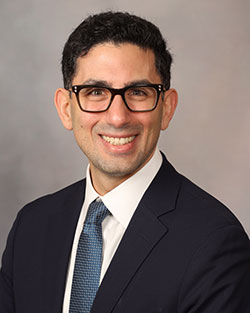

Victor G. Chedid, MD, MS
Mayo Clinic
1. Why is being an advocate so important to you?
Advocacy is a natural extension of our role as physicians. From the moment we take the Hippocratic Oath, we commit to respecting patient autonomy, delivering compassionate care without discrimination, upholding confidentiality and professionalism, and advancing scientific integrity with a focus on equity and justice. Advocacy allows us to amplify the voices of our patients, especially those from marginalized communities, and to shape systems that better reflect their needs.
As a physician, I’ve witnessed how identity and illness intersect; how stigma can distort care, and how compassion can transform it. That’s why I launched the IBD Pride Clinic: to provide affirming, expert care for LGBTQ+ individuals living with IBD. Every time a patient tells me, “This is the first time I’ve felt safe in a medical setting,” I’m reminded why advocacy matters. For me, advocacy means standing beside our patients and saying, “You belong here, and I’ve got you.”
2. What health-care related issue(s) have you advocated for over the past year?
Over the past year, my advocacy has centered on advancing health equity in gastroenterology, particularly for LGBTQ+ patients. Through the IBD Pride Clinic, I’ve had the privilege of caring for individuals from diverse backgrounds and identities. These experiences have taught me the power of listening, learning, and unlearning. My patients’ stories have illuminated the challenges of navigating healthcare as an LGBTQ+ person with a chronic condition like IBD, and they’ve inspired me to advocate through ethical research, clinical innovation, and education.
I’ve heard recurring themes: delayed care due to fear of mistreatment, discomfort with identity disclosure, and a lack of affirming spaces. These voices are now driving real change; through inclusive spaces, changes to intake forms, EMR documentation updates, staff training, and community-based research partnerships.
I’ve contributed to this work through service on multiple committees: Mayo Clinic’s GIH Belonging Committee and Office of Health Equity; the American Gastroenterological Association’s Diversity Committee and Future Leaders Program; the Crohn’s & Colitis Foundation’s Diversity Committee; and the Minnesota Medical Association, where I chair the LGBTQ+ section and serve on the Optimal Health for All advisory committee. I also serve on the executive board of Rainbows in Gastro, an advocacy NGO. All of these efforts are rooted in a core belief: healthcare should be a place of healing for all, not harm.
3. What advice would you offer to others who are interested in advocacy?
Start with your heart. Advocacy doesn’t require a podium, it begins with listening, with caring deeply, and with the courage to speak up when something isn’t right. Identify the issues that move you, and let that passion guide your work. The most powerful advocacy centers the voices of those we serve.
You don’t need a title, just a willingness to care deeply and act boldly. And remember, you’re never alone. Some of the most meaningful change happens when we come together, share our stories, and lift each other up. Collaborate. Stay curious. Stay humble. Even small acts of advocacy can ripple outward in profound ways. Whether it’s in the clinic, the community, or the legislature, every effort counts.
